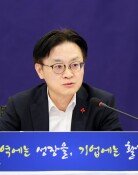[Editorial] Economic Policies Lack Sense of Crisis
[Editorial] Economic Policies Lack Sense of Crisis
Posted March. 11, 2008 03:05,
The Ministry of Strategy and Finance reported to the president that it would lower its macroeconomic growth target. It seems that the ministry had no choice but to change its growth target due to aggravating economic conditions at home and abroad. The governments new promise of 6-percent economic growth and new jobs of 350,000 is far weaker than the governments initial promise of 7-percent economic growth and new jobs reaching 600,000. The problem is the new goals are also a tall order as international raw material prices have gradually increased and the U.S. economy has shown clear signs of a protracted slowdown.
The Korean economy facing difficulties at home and abroad is literally teetering on the verge of crisis. Private economic think tanks, which have estimated that the nations economy would grow around four percent this year, are considering lowering their initial economic forecasts. Hwang In-seong, senior researcher of Samsung Economic Research Institute, expressed concerns, saying, The economy will inevitably top out in the first quarter since it is encircled by four challenges: stock market crash, dull employment, price uncertainty and sluggish domestic consumption.
Whenever a new government comes to power, it talks about rosy prospects. However, it frequently turns out that the governments rosy forecasts are unrealistic. Recently, Korean people have higher expectations for economic recovery than ever before. However, the new governments team in charge of economic policies should first deal with price uncertainties, before trying to boost the economy. The general public has a ray of hope that recent economic uncertainties would disappear soon and that the new government would successfully revive the economy. President Lee Myung-bak and the government need to be candid, while articulating what they can do and what they cannot. Choi Seung-roh, researcher of Center for Free Enterprise, said, The government needs to talk about realities in a frank manner and win the sympathy instead of inspiring unrealistic dreams into the general public.
The ultimate answer should be in strengthening economic fundamentals which have weakened for the past few years, through deregulating and increasing investment. In that regard, the governments policy to pursue sustainable economic growth by easing regulations and lowering tax rates is considered realistic. The government should boost corporate activities by reducing regulations and tax rates and privatize state-owned companies more proactively. Even though economic conditions have worsened, companies have a vast amount of money in their coffers since they have hesitated to invest for the past few years. The key to success is whether the government can successfully improve investor sentiment and boost corporate investment via deregulation.
However, the governments policy to lower corporate tax rates can aggravate the governments financial strains. Therefore, it needs to take more cautious attitudes when reducing corporate tax. For example, it should closely watch whether a tax cut effectively boosts corporate investment and how much it affects the governments finances.






![반찬통 착색 고민 끝…‘두부용기’ 버리지 말고 이렇게 쓰세요 [알쓸톡]](https://dimg.donga.com/c/138/175/90/1/wps/NEWS/IMAGE/2026/01/09/133126593.3.png)
